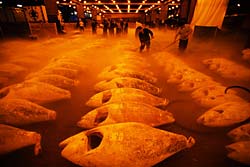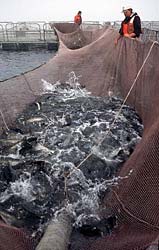   |
|
Grading & Expectations
Although your final grade for 12.000 will be a pass (P) or will not appear on your record at all (NR), you should know that your instructors for this subject will not judge your work as passing or failing. On the grade sgeet that you will receive
at the end of the semester you'll see an actual grade, but as stated before, it doesn't appear on your permanent record. The grade is an important message from your instructors to you, and it reflects how closely you met their (and your) expectations.
 Overview OverviewIn our second class, we will divide the class into approximately ten teams, each of which will be charged with proposing a component for the final plan for saving the fisheries. Each team will develop a proposal in the form of a Team Wiki. This work - which is best considered the "research phase" of 12.000 - is expected to to be complete by November 2nd. Subsequently, the class will discuss the various proposals and decide on the basic structure of a final plan by November 5th. Each team will be assigned one or two undergraduate teaching fellows (UTF's) and one or more Alumni Mentors to serve as information resources. The UTF's, most of whom are veterans of 12.000, can give you tips on how best to work toward a successful conclusion. The Alumni Mentors can provide more general suggestions as to how they tackle complex problems like those posed in Mission 2011. An important aspect of 12.000 is its emphasis on teamwork. Consequently, 70 percent of your grade depends on the performance of your team and the class as a whole, whereas the remaining 30 percent comes from your individual performance. Major Assignments: The challenges presented to the class on the home page will be fulfilled when two assignments are completed.  First, the class must create a content-rich web site to describe and justify its overall design. More details regarding the Project Web Site are located here. First, the class must create a content-rich web site to describe and justify its overall design. More details regarding the Project Web Site are located here.
Second, the class will make a final, one-hour, oral presentation of its solution on December 4, 2006. This presentation will be open to the ventire MIT community and will be broadcast over the Internet. In addition, a panel of experts will be invited to attend the presentation and to critique them in open forum. Because it would be logistically difficult for everyone to speak during the presentation, staff recommends that each team elect one member to join a "presentation committee" that will choreograph a present the final broadcast. The committee member should not bear sole responsibility for the work involvedin developing the presentation: pull your weight! Individual Grade Component Thirty percent of your grade reflects how well you, as an individual, met the expectations of the teaching staff over the course of the semester. They expect that you will:
Team Grade Component  Although we expect that all teams will coordinate their efforts to complete the "deliverables" described above, each team will establish its own performance expectations at the beginning of the semester and the final team grade will reflect how well those expectations were met. Here's how it works. At the first team meeting of the semester, your team members should converse and decide what you must accomplish by
the end of the semester in order to earn a team grade of "A". Articulated in a single paragraph and submitted to your UTF's, this set of expectations constitutes a contract between your team and the faculty. At the end of the semester
your team will be asked to review this paragraph, determine how well you met those expectations, and propose a grade for your team.
If you fulfilled all of your expectations you deserve an A; whereas, if you fulfilled most of them, you deserve a B. If you were only halfway successful, you deserve a C; and, of course, less than half, fails.
You will submit the grade your team believes it deserves to the faculty. Simultaneously, the UTF's assigned to your team
and the TA will make independent assessments of your team's performance. Based on all assessments, staff will assign the final team grades. Although we expect that all teams will coordinate their efforts to complete the "deliverables" described above, each team will establish its own performance expectations at the beginning of the semester and the final team grade will reflect how well those expectations were met. Here's how it works. At the first team meeting of the semester, your team members should converse and decide what you must accomplish by
the end of the semester in order to earn a team grade of "A". Articulated in a single paragraph and submitted to your UTF's, this set of expectations constitutes a contract between your team and the faculty. At the end of the semester
your team will be asked to review this paragraph, determine how well you met those expectations, and propose a grade for your team.
If you fulfilled all of your expectations you deserve an A; whereas, if you fulfilled most of them, you deserve a B. If you were only halfway successful, you deserve a C; and, of course, less than half, fails.
You will submit the grade your team believes it deserves to the faculty. Simultaneously, the UTF's assigned to your team
and the TA will make independent assessments of your team's performance. Based on all assessments, staff will assign the final team grades.
|
   |